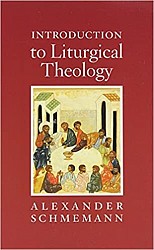TheologyTheologyTheologyIntroduction to Liturgical Theology
1033Tags:Alexander Schmemann's Introduction to Liturgical Theology is a masterful historical and critical introduction to the study of modern Orthodox liturgics and theology. There is scarcely a student of Christian worship who has not been stirred by the brilliant mind of the late Orthodox theologian Alexander Schmemann. He was deeply stimulated by modern movements and figures in Western Christian thought. He brings into the Western discussion of Christian unity, the relation of the Church to the world in revolution, the question of papal supremacy, and the effort to commend the gospel to a post-Christian world'a worldview at once Orthodox, patristic, and realistic. His sacramental realism and wholeness is exciting and refreshing for those, both Protestant and Roman Catholic, who have been reared on scholastic categories. The present work was basic to much of Schmemann's academic research and creativity. In it, he defines liturgical theology, noting that the dynamic realism of the Eucharistic liturgy often has been obscured in popular liturgical piety. This theme is developed in reference to the shape of worship as it evolved in the Orthodox Church, from the earliest years to its crystallization in Byzantium from the ninth through the twelfth centuries.
TheologyThe Orthodox Way
1001Tags:This book is a general account of the doctrine, worship and life of Orthodox Christians by the author of the now classic The Orthodox Church. It raises the basic issues of theology: God is hidden yet revealed; the problem with evil; the nature of salvation; the meaning of faith; prayer; death and what lies beyond. In so doing, it helps to fill the need for modern Orthodox catechism. Yet this book is not a mere manual, a dry-as-dust repository of information. Throughout the book, Bishop Kallistos Ware shows the meaning of Orthodox doctrine for the life of the individual Christian. Doctrinal issues are seen not as abstract propositions for theological debate but as affecting the whole of life. A wealth of texts drawn from theologians and spiritual writers of all ages accompanies Bishop Kallistos' presentation. They, too, reveal Orthodoxy not just as a system of beliefs, practices and customs but indeed as the Way.
TheologyThe Wedding in Cana
1011Tags:In the present volume, Fr George focuses his attention on the Gospel of John, and specifically the marriage feast in Cana. This episode, at the beginning of the Gospel, offers a unique and important lens that brings into focus many themes that occur throughout the Gospel, climaxing in the Passion: the first of his signs manifesting his glory, the third day, the hour, the woman, the changing of water into wine, the best wine, and, of course, the marriage itself. Fr George offers us twelve meditations on different aspects of this episode, bringing to bear insight drawn from the Scriptures, the Fathers, Liturgy and its hymnography, modern theologians and scriptural scholars.
TheologyTheology As a Surprise: Patristic and Pastoral Insights
1019Tags:In this book, His Grace Bishop Maxim (Vasiljevi) offers us a breath of fresh air. This is not a book of theology in the form we have become accustomed to expect: a systematic examination of the usual topics of theological reflection; it is much more than that. Bishop Maxim draws upon Scripture, the Fathers, and Liturgy to address perennial and yet very contemporary questions: our experience of time and history, our existence as human persons and the complexities of sexuality and gender, our life in the polis and the ekklesia, and the relational presence of an icon in a world saturated with digital images.
Time and Man
1016Tags:Man tends to see time as a factor in life that needs no explanation, and thinks that he knows what it is. But when he happens to ask questions about the nature of time and tries to define it, he becomes aware of his inability to do so. The question of man's correct orientation in his life is, in fact, a question of his correct orientation in time; and correct orientation in time presupposes a moving towards, and an examination of, the possibilities and perspectives afford by time. Time is offered to man as a context for his dealings and encounters with his neighbor and with God. Time is also seen as the place where the love of God is revealed. Within time man shows, or fails to show, love for his neighbor. Finally, it is within time that man achieves, or fails to achieve his proper orientation within the world around him. This book includes discussions on such issues as the problem of time, space and time, Christ and time, Church and time, the transfiguration of time and liturgical time - among others. In addressing such topics, the author shows how these are not simply abstract theological issues, but that they indeed affect the entire spiritual orientation of man. Georgios I. Mantzaridis is one of the foremost Orthodox theologians of our day. Born in Thessaloniki, Greece in 1935, he is Professor of Ethics and Sociology of Christianity at the Theological School of the Aristotelian University of Thessaloniki. Professor Mantzaridis is the author of numerous books, many of which have been translated into several languages. His main works available in English include The Deification of Man (New York, 1984) and Orthodox Spiritual Life (Brookline, Mass., 1994). His textbooks on Christian Ethics and Sociology of Christianity are considered by many Orthodox scholars to be classics in their fields.








